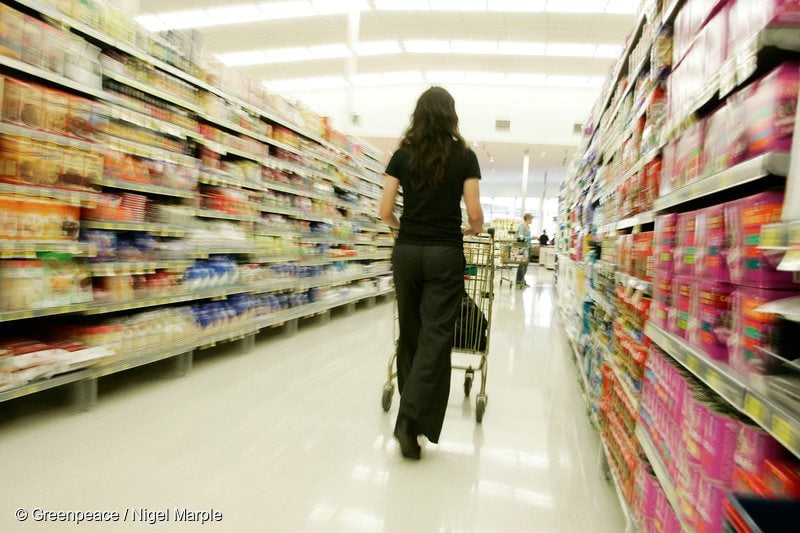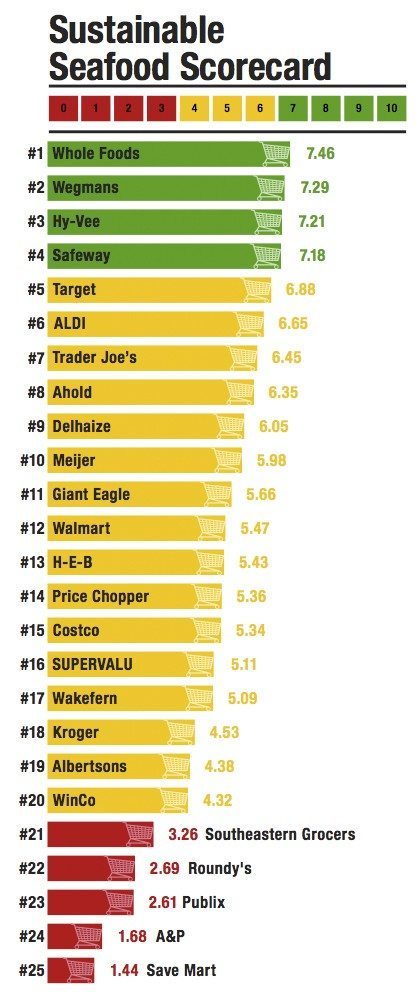Supermarkets—where U.S. shoppers buy about half of our seafood—are one of the strongest connections to our oceans. As consumers, our choices matter for the health of our oceans and the workers who bring seafood to our plates.
Today, we released the 2015 edition of the Carting Away the Oceans report, shining a light on which of the country’s major grocery chains are leaders in sustainable seafood and which are falling behind.
The findings are telling. While retailers like Whole Foods, Wegmans, Hy-Vee and Safeway are doing the best job of offering ocean safe seafood options, major chains like Walmart, Kroger, Albertsons, and Publix are linked to destructive fishing practices, and some companies are even linked to slavery and human rights abuses.
So before heading to the grocery store, make sure to do your research to find out if your supermarket is doing its part on these three key issues to protect our oceans and the people that depend on them.
1. Demand that Seafood Is Not Connected to Humans Rights Abuses
Slavery and human rights abuses are a major and growing concern in the seafood industry, and supermarkets have an important role to play in solving the problem.
Nearly 21 million people worldwide are trapped in forced labor, and several recent investigations have implicated the seafood industry as one of the top offenders. Several major companies were implicated in connections to egregious human rights abuses, and it is time for demonstrable action from all major seafood buyers.
This is an industry-wide problem, and U.S. supermarkets need to take responsibility and hold the companies providing their seafood accountable. Companies like Whole Foods, Wegmans, Hy-Vee, Safeway have begun to take initial steps to address this problem, but there is much more work to be done.
Ask your grocery store to stop human rights abuses in the seafood industry.
2. Look for Ocean Safe Tuna
If you eat canned tuna, it’s important to watch what you buy. About 80 percent of the canned tuna products on U.S. supermarket shelves today come from destructive, irresponsible and wasteful fishing practices.
Whole Foods, Safeway, Hy-Vee, Target, Trader Joe’s, and Costco all carry at least one sustainable tuna option, but if you shop in other stores, it’s best to steer clear of the canned tuna section.
Find out which canned tuna brands are ocean safe in our Tuna Shopping Guide.
3. The Bering Sea Matters, for You and Your Grocery Store
Roughly half of all seafood caught in the U.S. comes from the Bering Sea. Despite the enormous importance of this area to the seafood industry—not to mention the environment and the indigenous people of coastal Alaska—overfishing and destructive fishing practices are threatening vulnerable habitat in the world’s largest underwater canyons.
Just this year, Whole Foods, Wegmans, Costco, Giant Eagle, Roundy’s, and Southeastern Grocers have joined the call asking the North Pacific Fishery Management Council to take action and protect the Bering Sea Canyons. We need other retailers to do the same, especially big ones like Walmart, Kroger, Albertsons-Safeway, and Publix.
What You Can Do
First and foremost, wield your consumer power!
These companies care about what their customers think, so let them know you need them to do better when it comes to sustainable, socially responsible seafood.
Learn all about how your favorite supermarket treats the oceans at the Greenpeace Sustainable Seafood Hub. If you’re ready to go deeper, there’s plenty to dig into in the full Carting Away the Oceans report.
At a glance, here’s how the country’s largest retailers ranked:
Tell Walmart: We Demand Ocean-Safe Seafood!
Sign up for Greenwire—our new social networking site—and connect with volunteers in your area who want to make a difference. On July 25, Greenwire members across the country will descend on Walmart to tell the world’s largest retailer to protect our oceans, ensure fair, safe working conditions for seafood industry workers, and sell sustainable seafood! After RSVPing, be sure to check your email to finish the registration process and keep informed of local Greenwire events.
Visit Greenpeace Greenwire to sign up and learn more.




